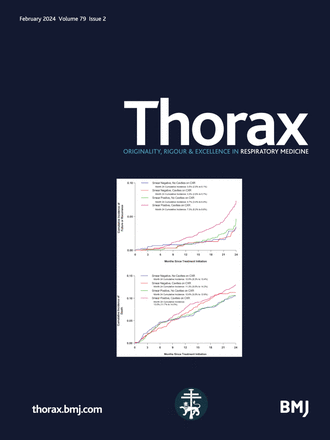Severe community-acquired pneumonia (sCAP): advances in management and future directions.
IF 9
1区 医学
Q1 RESPIRATORY SYSTEM
引用次数: 0
Abstract
Severe community-acquired pneumonia (sCAP) is a major global health challenge, with high morbidity and mortality, especially among patients requiring intensive care. Despite advancements in antimicrobial therapies and supportive care, sCAP remains a significant threat, particularly for those needing invasive mechanical ventilation or vasopressor support. Recent progress in diagnostics, therapeutics and management strategies offers hope for improved outcomes. Pathogen-specific management is now central to sCAP care, with molecular diagnostics enhancing pathogen detection accuracy and enabling tailored antimicrobial therapy. These tools help combat antimicrobial resistance by reducing unnecessary broad-spectrum antibiotic use.Host immune responses in sCAP vary widely and significantly impact outcomes. Some patients face an overwhelming pathogen burden, while others experience excessive immune responses, such as acute respiratory distress syndrome. This distinction is vital for guiding immunomodulatory therapies, as immunosuppression may benefit hyperinflammatory states but harm those overwhelmed by infection. Corticosteroids, though controversial, show potential benefits in select populations but carry risks like secondary infections and hyperglycaemia, requiring a nuanced approach.Non-invasive respiratory support strategies, such as high-flow nasal oxygen, have transformed care by improving oxygenation and reducing the need for invasive ventilation. However, their efficacy depends on timing, patient tolerance and disease severity, necessitating careful monitoring.Global disparities in sCAP management, particularly in low-income and middle-income countries, highlight the need for region-specific guidelines and scalable solutions. Limited access to advanced diagnostics and critical care resources exacerbates poor outcomes, underscoring the importance of investments in affordable diagnostics, infection control and multidisciplinary training. Emerging technologies, such as artificial intelligence and advanced imaging, promise to revolutionise sCAP management by enabling precision medicine and real-time insights into disease severity. A holistic, multidisciplinary approach integrating these advancements is essential to improving outcomes and advancing personalised care for this life-threatening condition.重度社区获得性肺炎(sCAP):治疗进展及未来发展方向
严重社区获得性肺炎(sCAP)是一项重大的全球卫生挑战,发病率和死亡率高,特别是在需要重症监护的患者中。尽管抗菌治疗和支持治疗取得了进展,但sCAP仍然是一个重大威胁,特别是对于那些需要有创机械通气或血管加压剂支持的患者。诊断、治疗和管理策略方面的最新进展为改善结果带来了希望。病原体特异性管理现在是sCAP护理的核心,分子诊断提高了病原体检测的准确性,并实现了量身定制的抗菌治疗。这些工具通过减少不必要的广谱抗生素使用,帮助对抗抗菌素耐药性。sCAP的宿主免疫反应差异很大,并显著影响预后。一些患者面临压倒性的病原体负担,而另一些患者则经历过度的免疫反应,如急性呼吸窘迫综合征。这种区别对于指导免疫调节治疗至关重要,因为免疫抑制可能有利于高炎症状态,但对感染不堪负荷的状态有害。皮质类固醇虽然存在争议,但在特定人群中显示出潜在的益处,但也存在继发性感染和高血糖等风险,需要谨慎对待。无创呼吸支持策略,如高流量鼻氧,通过改善氧合和减少有创通气的需要,已经改变了护理。然而,它们的疗效取决于时机、患者耐受性和疾病严重程度,因此需要仔细监测。sCAP管理方面的全球差异,特别是在低收入和中等收入国家,突出表明需要制定针对特定区域的指导方针和可扩展的解决方案。获得先进诊断和重症监护资源的机会有限,加剧了不良结果,强调了投资于负担得起的诊断、感染控制和多学科培训的重要性。人工智能和先进成像等新兴技术有望实现精准医疗和对疾病严重程度的实时洞察,从而彻底改变sCAP管理。综合这些进步的整体多学科方法对于改善这种危及生命的疾病的结果和推进个性化护理至关重要。
本文章由计算机程序翻译,如有差异,请以英文原文为准。
求助全文
约1分钟内获得全文
求助全文
来源期刊

Thorax
医学-呼吸系统
CiteScore
16.10
自引率
2.00%
发文量
197
审稿时长
1 months
期刊介绍:
Thorax stands as one of the premier respiratory medicine journals globally, featuring clinical and experimental research articles spanning respiratory medicine, pediatrics, immunology, pharmacology, pathology, and surgery. The journal's mission is to publish noteworthy advancements in scientific understanding that are poised to influence clinical practice significantly. This encompasses articles delving into basic and translational mechanisms applicable to clinical material, covering areas such as cell and molecular biology, genetics, epidemiology, and immunology.
 求助内容:
求助内容: 应助结果提醒方式:
应助结果提醒方式:


